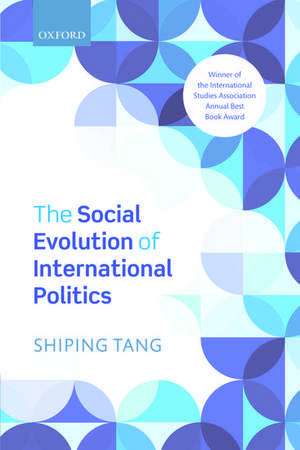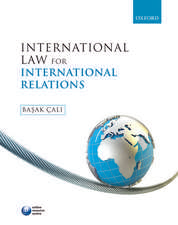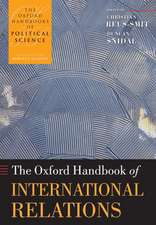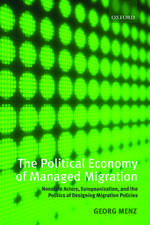The Social Evolution of International Politics
Autor Shiping Tangen Limba Engleză Paperback – 12 noi 2015
| Toate formatele și edițiile | Preț | Express |
|---|---|---|
| Paperback (1) | 303.21 lei 31-38 zile | |
| OUP OXFORD – 12 noi 2015 | 303.21 lei 31-38 zile | |
| Hardback (1) | 775.35 lei 31-38 zile | |
| Oxford University Press – 13 iun 2013 | 775.35 lei 31-38 zile |
Preț: 303.21 lei
Nou
Puncte Express: 455
Preț estimativ în valută:
58.02€ • 62.04$ • 48.38£
58.02€ • 62.04$ • 48.38£
Carte tipărită la comandă
Livrare economică 07-14 aprilie
Preluare comenzi: 021 569.72.76
Specificații
ISBN-13: 9780198753582
ISBN-10: 0198753586
Pagini: 294
Dimensiuni: 160 x 235 x 16 mm
Greutate: 0.44 kg
Editura: OUP OXFORD
Colecția OUP Oxford
Locul publicării:Oxford, United Kingdom
ISBN-10: 0198753586
Pagini: 294
Dimensiuni: 160 x 235 x 16 mm
Greutate: 0.44 kg
Editura: OUP OXFORD
Colecția OUP Oxford
Locul publicării:Oxford, United Kingdom
Recenzii
[The book] contains seriously original and insightful thinking that should stimulate reconsideration of some major positions and debates in International Relations . . . Quality big thinking like this does not come along often . . . this is a book that deserves a wide readership. It makes some big and important points about how to study IR, which the discipline would undoubtedly benefit from debating.
In this exciting new book, Tang argues for a Social Evolution Paradigm (SEP) as the basis of social scientific and international relations theorizing. Simultaneously provocative and insightful, Tang provides an historically sweeping account of international political transformations and their relationship to theories of international relations. In so doing, Tang provides ample evidence that his approach encourages better understanding not just of international politics but also of how we have and should study it.
Professor Shiping Tang advances a bold and provocative argument. He submits that human society has historically evolved from relatively benign relations in hunter-gatherer societies, to offensive realism systems, then to defensive realism systems, and finally to a more institutionally rule-based international system. Prevalent international relations theories, such as realism and liberalism, are historically contingent rather than trans-historical theories. Tang's social evolutionary account aims to encompass these prevalent arguments while providing a broad overview of the international system from its beginning to the present day.
In social science evolution is usually used as a metaphor, but in his insightful and important study Shiping Tang takes it serious and shows how IR has actually evolved. In doing so he revises and reconciles many of our familiar theories and casts a fresh and fascinating light on the inter-relations among war, states, and societies. A truly sweeping account.
Shiping Tang has produced a non-determinist and non-reductionist approach to social evolution that is distinct from and critical of evolutionary psychology. His version of a beneficial mutation is a good idea, which may triumph depending on context and the power of its supporters. His approach is the kind of good idea that with the right friends may encourage the evolution of international relations.
In this exciting new book, Tang argues for a Social Evolution Paradigm (SEP) as the basis of social scientific and international relations theorizing. Simultaneously provocative and insightful, Tang provides an historically sweeping account of international political transformations and their relationship to theories of international relations. In so doing, Tang provides ample evidence that his approach encourages better understanding not just of international politics but also of how we have and should study it.
Professor Shiping Tang advances a bold and provocative argument. He submits that human society has historically evolved from relatively benign relations in hunter-gatherer societies, to offensive realism systems, then to defensive realism systems, and finally to a more institutionally rule-based international system. Prevalent international relations theories, such as realism and liberalism, are historically contingent rather than trans-historical theories. Tang's social evolutionary account aims to encompass these prevalent arguments while providing a broad overview of the international system from its beginning to the present day.
In social science evolution is usually used as a metaphor, but in his insightful and important study Shiping Tang takes it serious and shows how IR has actually evolved. In doing so he revises and reconciles many of our familiar theories and casts a fresh and fascinating light on the inter-relations among war, states, and societies. A truly sweeping account.
Shiping Tang has produced a non-determinist and non-reductionist approach to social evolution that is distinct from and critical of evolutionary psychology. His version of a beneficial mutation is a good idea, which may triumph depending on context and the power of its supporters. His approach is the kind of good idea that with the right friends may encourage the evolution of international relations.
Notă biografică
Shiping Tang has very broad research interests and has published widely. He is the author of A Theory of Security Strategy for Our Time: Defensive Realism (Palgrave-Macmillan 2010) and A General Theory of Institutional Change (Routledge, 2011). He is also the co-editor of Living with China: Regional States and China through Crises and Turning Points (Palgrave-Macmillan 2009). His most recent publications include many articles in leading journals in international relations, comparative politics, and philosophy of social sciences. His most recent book The Social Evolution of International Politics published with Oxford University Press in 2013. He is Professor at the School of International Relations and Public Affairs (SIRPA), Fudan Univeristy, Shanghai, China.















